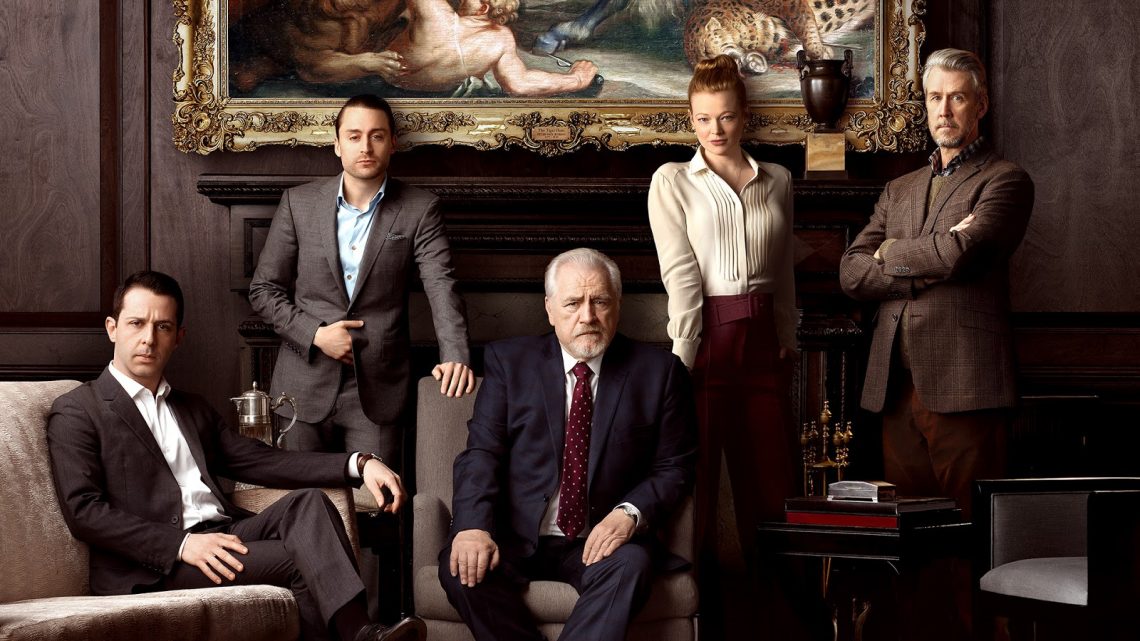
HBO’s ‘Succession’ Was the Most Realistic TV Show of 2018
December 13, 2018This article originally appeared on VICE Canada.
No piece of pop culture can fully sum up a historical moment, but HBO’s epic family drama Succession does a very solid job of diagnosing 2018 as a year of unfettered privilege and corruption built on a rickety foundation of mediocrity, bolstered by inherited power and influence. And it does so without dumbing anything down, or worse glorifying the excesses of the super-rich by offering “anti-heroes” for us to root for.
I love Mad Men, Game of Thrones, and Breaking Bad, and count myself as lucky to live in the era of “peak TV,” but I also can’t deny the many claims that we’ve mythologized bad men to an unhealthy degree. I won’t go as far as to blame Tony Soprano for the rise of Donald Trump, but I also I won’t pretend to be entirely comfortable with the sympathy and even admiration we are made to feel for certain onscreen monsters.
Succession doesn’t leave us much room for either emotion. It follows a family so morally bankrupt that the closest we can come to sympathy is a kind of pity that’s most often countered by the reality that these people have been given everything in life, and that the rest of us would be lucky to trade in our problems for theirs.
The series tells the story of the Roy family, owners of media empire Waystar Royco, at a pivotal moment when stern patriarch Logan Roy—played beautifully by Brian Cox, channeling a modern-day King Lear—is suffering from ill-health, leaving the fate of the company uncertain.
The series closest thing we have to a single protagonist is Kendall Roy, the most active of the Roy children at Waystar Royco, who rather forcefully steps in as CEO of the company while his father is indisposed—and also puts a plan into motion to take over, setting off a series of escalating conflicts and family feuds. Kendall is ruthless, and his showdown with his equally ruthless father feels Earth-shattering. In one powerful scene late in the season, Logan challenges Kendall to explain why he’s taken the old man on at all, and Kendall has no answer. It’s an unfair question coming from the equally arbitrarily power-hunger patriarch, but one that informs the whole show. There’s no reason for any of this. These people are rich beyond imagining, but each would happily kill the others for just a little more.
It’s all horrifying. But it’s also relentlessly funny in that way only awful people behaving badly can be. I constantly found myself laughing, then feeling guilty for laughing, then giving into the absurdity of the world we live in and laughing again—laughing to avoid just giving up and moving to a cabin off the grid, away from the hellscape we call society.
Rupert Murdoch and his children, heirs to the Fox media empire, are the obvious referents, but the dysfunctional, financially incestuous nature of the Roy's politics feels of a kind with Donald Trump and his sycophantic children (and son-in-law Jared Kushner), always grasping at whatever power might be available through their father’s presidency.
Any 1:1 comparison would cheapen what the Succession team has achieved though, which is to create compelling stories centered around these characters. There’s no way I’d want to watch the goings on of the Trump family, if given the choice. The feeling of repulsion they inspire is matched only by how utterly boring they all seem.
Succession’s solid writing and frankly phenomenal acting achieve a lot, making the Roys seem far more three-dimensional than the cardboard cutouts that make up Trump’s brood.
The most outwardly cruel and selfish of the bunch, or maybe just the most honest, is youngest son and brother Roman, played by the now twice Golden Globe-nominated Kieran Culkin in what may become a career-defining performance. During a family baseball game, Roman invites a young boy, the son of a groundskeeper, to play with the Roys, though the game Roman has in mind isn’t quite what the boy expects. Roman writes him a check for $1 million, promising it only if the child can hit a home run. When the kid inevitably fails, Roman, with all the glee of a boy ripping the legs off a spider, tears up the check inches from the kid’s face. What stands out in this scene is that while the other Roys are visibly made uncomfortable by Roman’s cruelty and flaunted wealth, they still play to put the kid out rather than letting him run the bases. Rules are rules, I guess, at least some of the time.
Only-daughter Shiv is possibly the most relatable. She’s not good, but she sees through the nastiness of the family business. She wants out, but only to the extent that she wants to feel like she stands on her own. In reality, she benefits from and is defined by her family name, opting to work as a political advisor instead of working for the family. In the end, that division isn’t so clean, and her successes can’t be evaluated without the reality of nepotism, which is a card Shiv plays every chance she gets.
The oldest of the clan is Connor, a dipshit faux philanthropist who fashions himself as the black sheep of the family, somehow above it all even as he weasels himself back in constantly, and lives off of the family wealth without having any real ambition of his own. He’s probably the most amusing to watch in his cocky ineptitude and complete lack of self-awareness.
Tom and Greg are some of the best and funniest characters in the series. They’re both outsiders, though neither really functions as a stand-in for the audience, as you might initially expect. Tom is engaged to Shiv and painfully attached to living like the rich. He passes on what he’s learned to Greg—a down-on-his-luck Roy cousin who wants into the family business—relishing every moment of being above someone else in the family for a change. Tom sucks up to his bosses (and new family) to an absurd degree, but he bullies Greg mercilessly too. He’s the personification of the principle that you can judge a person’s character by how they treat those who can’t help them advance. And Greg takes it. All of it. He has to. Just like he has to take a punch in the arm from a viciously frustrated Roman who’s just been bullied by his own father. There’s a food chain of abuse, and everyone knows their place in it.
But for all their faults (and narrative centrality), these aren’t anti-heroes. They range from harmless dolts to conniving sociopaths. As Tom learns the ropes of the family company, the phrase “knowing where the bodies are hidden” takes on a literal meaning. Or if there aren’t literal bodies, there’s a network of sexual abuse cover-ups, a trail of NDAs, payoffs, and threats made to those who have been profoundly harmed by the Roys over the years. Tom’s horror at learning this is one of a few moments of humanity in the series when characters see the line they’re about to cross, understanding the implications of what they do for a living. It’s always short-lived, though. They all inevitably cross the lines anyway, making their willful blindness all the more reprehensible.
That the family has gotten off scot-free for all this time is less a testament to their skill or intelligence and more to their wealth and ability to hire the right people to cover things up, or lawyers to find loopholes that effectively make their actions legal after the fact. The rich and powerful already aren’t held to the same standards as the rest of us, but to the extent that any work or intelligence is needed, there’s always someone else on call to do the heavy lifting.
And that’s the heart of all this. Perhaps the most damaging part of the myth of the anti-hero is the premise that unscrupulous protagonists are good or great at what they do, that they are somehow redeemed by their abilities. There’s no real evidence that success, in the corrupt capitalist system that perpetually gives those with money even more money, comes from merit.
Every day, it becomes more obvious that the emperor has no clothes, that the system is a lie. Ross Douthat’s New York Times column last week titled “Why We Miss the WASPs” was met with ridicule online because of its blatant revisionism. The whole thing felt like an intellectual masturbation session, throwing around ideas about simpler times when America was ruled by a more capable class of people. Douthat longs for “the old establishment's more pious and aristocratic spirit,” which is an idea that’s naive at best and blatantly racist at worst. It also ignores the self-perpetuating nature of such a class-based system, where being born into power doesn’t actually require skill, compassion, intelligence, or any kind of good work ethic. But the system is good to some, so it lives on.
Just last week, Rudy Giuliani accidentally created a hyperlink in one of his tweets when he omitted a necessary space. A perfectly innocent, expected, and forgivable typo. But when someone purchased the unclaimed domain the former New York Mayor and current lawyer to President Trump had linked to and turned the landing page into an anti-Trump banner, Giuliani got a little upset and a lot stupid about it. He blamed Twitter for allowing someone to “invade” his tweet, as though the prank had required access to the tweet itself on Twitter’s back end.
I’m not sure if the incident looks worse for Giuliani, who simply has no understanding of Twitter or the internet, or on Trump, who appointed such a man as his cybersecurity advisor in 2017. Either way, the two men of means (and power) don’t inspire much confidence.
As former First Lady Michelle Obama put it recently: "I have been at probably every powerful table that you can think of, I have worked at nonprofits, I have been at foundations, I have worked in corporations, served on corporate boards, I have been at G-summits, I have sat in at the UN; they are not that smart."
Succession gets this about the rich and powerful. It offers an antidote to the anti-heroes of other “prestige dramas,” frequently portrayed as the best of the best. The Roys don't have the sex-appeal or competence of Don Draper, or the genius of Walter White, or the raw get-it-done-ness of Tony Soprano. They're the lucky rich we actually see in the world, whether the Trumps, the Murdochs, the Elon Musks, or the countless other super-wealthy symbols of mediocrity who run the world. But they still have all those negative traits of the rich and powerful: greed, corruption, criminality, misogyny, instability, and on, and on.
There’s also an undeniable sense of schadenfreude when their plans blow up in their faces (sometimes quite literally). I’m not above basking in the failures of bad people. And while real-world consequences make it hard to enjoy the failures of world leaders or those who hold the fates of thousands in their hands, Succession doesn’t burden us with any actual fallout.
As with the best scary movies, Succession allows us to work out our very real and very current fears, anxieties, and frustrations in the utmost security of our homes. It does so by reflecting our painfully flawed world right back to us.
Sign up for our newsletter to get the best of VICE delivered to your inbox daily.
Follow Frederick Blichert on Twitter.


